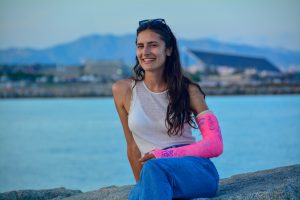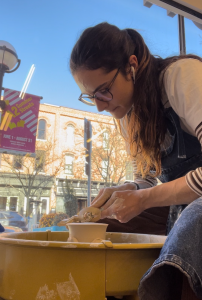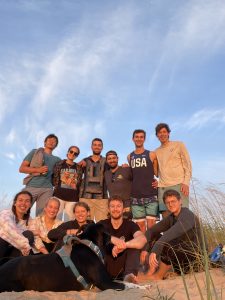Our first week of medical school at the University of Michigan this past summer, I sat in South Lecture Hall with 163 of my new classmates listening to incredible physicians share their philosophies on the practice of medicine. These lectures were inspiring, ranging from how to make the most out of your medical education to how to make the most out of not just your medical career, but your life. One lecture in particular struck me: Chris Sonnenday, MD, a transplant surgeon, talking to us about the small acts of care that make the biggest difference to patients.

I entered medical school recovering from a distal radial ulnar joint injury— not an ideal way to start, but UMMS worked with me to make accommodations and my counselor even helped me find an appointment with a hand surgeon in Ann Arbor!
Dr. Sonnenday is the Surgical Director of Liver Transplantation for Michigan Medicine, and he performs complex hepatobiliary, oncologic and liver transplantation surgery, while also leading numerous research studies. For someone with such intense responsibilities, he is remarkably down to earth. He coaches his kid’s soccer team and runs marathons in his free time. When he started talking about patient care, he emphasized that he just tries to give his patients the honesty and humanity that he would want from his doctor. He described how before each of the surgeries he does, he has made it a practice to hold the hand of his patient while they fall asleep under anesthesia. Oftentimes this is the only thing patients remember when they awake from surgery — that they weren’t alone.
I sat in the lecture hall moved practically to tears and tried to write down takeaways from the lecture I had just heard. This proved difficult, as I was still recovering from donning a cast all summer after dislocating my wrist, and so these notes were even more illegible than my usual bad handwriting. Luckily, I was able to clearly write down Dr. Sonnenday’s email, and I decided to reach out to him that day to let him know how impactful his talk had been to me. To my surprise he responded right away and offered to meet with me to talk about my interests.
Pursuing Professional Interests: AI, Transplant Research and Inspiring Role Models
When we met on Zoom, I shared that I was interested in artificial intelligence for medical use cases — the research I pursued before medical school — and he immediately connected me to the Transplant Research, Education, and Engagement (TREE) team, where I’ve since started on a research project using computational tools to help optimize organ donor-recipient matching. The TREE team is a multidisciplinary group of data scientists, researchers and surgeons who collaborate on research projects in smaller groups and share their learnings with one another and the scientific community through manuscript publishing. TREE meets weekly to go through project updates from the broader transplant group at Michigan Medicine, and my smaller research group working on the donor-matching algorithm meets biweekly.
In addition to research opportunities, faculty like Dr. Sonnenday are very willing to allow students to shadow them and learn from their clinical practice. I was lucky to get to spend a day shadowing Dr. Sonnenday in his Liver Tumor Clinic. I accompanied him to see his clinic patients, all of whom he had formed longitudinal relationships with and spent the full appointment time (and sometimes more) ensuring that he answered all their questions. After each patient visit, he took further time to thoroughly explain the disease etiologies and relevant lab findings to me in detail.
I learned a lot that day, not just about cancer pathology and anatomy, but about what it really looks like to be a good doctor: someone who is unhurried and generous with their time, always making sure to thoroughly teach patients about their conditions, as well as teach trainees about how to care for these patients. Seeing his kindness, honesty and genuine care for each of his patients — whether they were the first patient of the day or the last one at the end of a long day of clinic — was so inspiring and modeled the type of physician I want to be one day. Many of my friends in medical school have had similarly impactful shadowing experiences with Michigan physicians who love teaching med students, starting as early as M1 year.
Introduction to Interprofessional Collaborative Skills: Shadowing a Sex Therapist
Doctors aren’t the only professionals we learn from and shadow as students. An integral part of our first-year curriculum includes the interprofessional collaborative skills introduction (ICS-I), which includes shadowing various health professionals such as nurse practitioners, physical therapists, social workers, doulas, music therapists, dietitians, pharmacists and pathologists. My ICS-I assignments proved to be equally valuable learning experiences as my day shadowing at the Liver Cancer Clinic. I was assigned to shadow a music/pet therapist, a child audiologist and a sex therapist, a social worker who specializes in sexual health counseling.
My first day of shadowing was with Amy Raad, LMSW, CST, a sex therapist at the Center for Vulvar Diseases, and I had no idea what to expect. Little did I know this would turn out to be one of the most interesting days of medical school so far. Amy is an expert in sexual health, women’s health, intimate relationship distress and trauma recovery. She works with patients to help overcome any concerns about sexual health or function after major changes like those brought about through radiation treatment for cancer. She sees an array of patients with varying conditions, from diverse backgrounds and age groups.
Amy made such a big impact on her patients with her openness, depth of knowledge and empathy. She was able to help patients feel comfortable talking about sexual health and function with seeming ease (although I’m sure that’s harder than she made it look!), and it was really inspiring to see her meet patients where they are and create a space where they felt safe to share difficulties rendered by their diagnoses. She was also just insanely cool. Before shadowing in the clinic, I didn’t know anything about this field, but after spending my day with Amy I was so thrilled to be part of a hospital system that offers these resources to patients. I left the clinic that day feeling assured that I had made the right choice in deciding to study medicine at Michigan.

Enjoying a sunset over Lake Michigan during a weekend trip to Grand Haven.
Life Outside Medical School: Ann Arbor, Student Orgs and Quiz-Free Weekends!
When I first began medical school, I was nervous about not being able to keep up with my life outside of school. As a nontraditional student, things like spending time with my family and friends, cultivating artistic outlets and pursuing research had grown paramount to my wellbeing in the years since I’ve graduated college, and I’ve gotten so used to having ample time for them. I was worried that M1 year wouldn’t allow me time for these diverse interests. Luckily, that worry was pretty unfounded — if anything, I feel encouraged to pursue these interests by everyone from the faculty and health professionals I shadow who share the important non-medicine-specific interests in their lives, to my doctoring coach who checks in on my self-care goals first thing every time we meet.

Taking a ceramics class at Ann Arbor Art Center!
Ann Arbor also provides ample opportunity to explore new interests. On a whim I applied for a financial
scholarship to take a ceramics class at the Ann Arbor Art Center, and now I’ve spent one night every week learning how to throw on the wheel and am working on a set of funky (read: lopsided) mugs as Christmas gifts for my roommates. Ceramics classes have been a really fun way to make friends outside of medical school, and they’re just one example of the myriad activities Ann Arbor has to offer for students.
While there’s basically a student group at Michigan Med for just about anything you might be interested in, if you don’t happen to find exactly the group you want, it’s really easy to create your own student group. In fact, this year, three friends and I started the AI in Medicine club to gather students interested in learning about AI developments in the medical field, host talks from faculty working in this field, connect students with research opportunities, and discuss ethical challenges of incorporating ever-advancing AI technology into our healthcare system.

Some med school friends during a camping trip to Sleeping Bear Dunes this fall (feat. Christopher the best dog ever).
Aside from these more organized activities, it’s been really fun just getting to know my amazing classmates. Since we have a non-quiz weekend approximately every two weekends, we take advantage of the free time to do things like go camping at Sleeping Bear Dunes, visit Lake Michigan, and host dinner parties. With all the rich opportunities for personal and professional growth afforded by Michigan Medicine, I’ve had an M1 year that has so far exceeded any and all expectations I had coming in. I can’t wait for what’s to come in my clinical year.
Don’t miss the next Dose of Reality.
Ellie Bowen is a first-year student at the University of Michigan Medical School originally from Grand Rapids, Michigan. In her free time she enjoys spending time with her niece and nephew in Ann Arbor, practicing yoga, and getting out in nature with friends. She can be followed on X @ellierosebowen.
